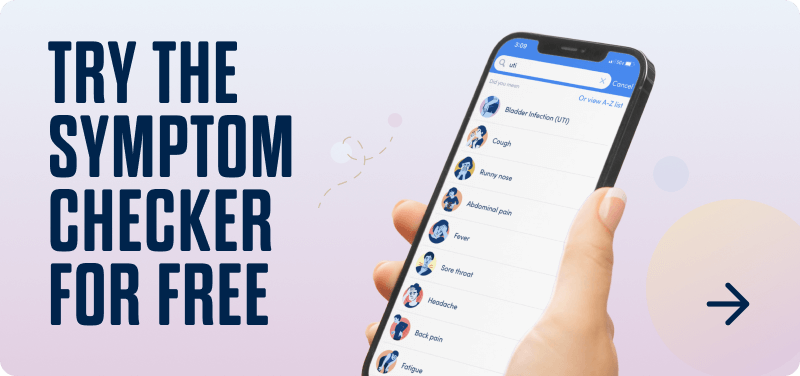Having high blood sugar puts you at risk for developing several chronic medical conditions, such as diabetes and heart disease. Normally, your body uses insulin to manage your blood sugar levels, and when there are problems with this mechanism, your blood sugar can become dangerously high.. Sometimes, changing your diet and other lifestyle alterations can help you naturally lower your blood sugar.
This article explores ways you can lower your blood sugar naturally by changing your diet, managing your stress, getting regular exercise, and focusing on your sleep. Lastly, learn when you should seek medical care for your blood sugar and how K Health can help you manage diabetes from home.
Eat More Fiber
Fiber should be a large part of your diet. However, here in the United States, adults usually only get about half the amount of fiber they need each day. There are two important types of fiber – soluble and insoluble fiber.
Soluble fiber forms a gel-like substance in your stomach and helps slow digestion and control your blood sugar and cholesterol. Soluble fiber is found in foods such as:
- Apples
- Bananas
- Oat
- Peas
- Black beans
- Lima beans
- Brussel sprouts
- Avocados
Insoluble fiber remains whole throughout digestion and supports bowel health and insulin sensitivity. Insoluble fiber is found in foods such as:
- Whole wheat flour
- Bran
- Nuts
- Seeds
- The skin of many fruits and vegetables
The Dietary Guidelines for Americans recommend adults eat 22-34 grams of fiber each day. Try to spread your fiber intake throughout the day. Start with a fiber-friendly breakfast, have a salad for lunch, snack on fruits, veggies, and nuts throughout the day, and add beans and legumes to salads, soups, and casseroles.
Drink Plenty of Water
Drinking water not only helps you manage your blood sugar, but it’s also essential for your overall health. Drinking water has many benefits, including preventing dehydration, helping you think more clearly, and keeping your mood steady. It also helps prevent constipation and kidney stones.
The total amount of water you should drink daily depends on your body type and how much water you get through your food. A good rule of thumb is trying to keep your urine a pale yellow color. Some tips to make sure you drink enough water throughout the day include:
- Carry a refillable water bottle with you
- Choose water over sugar-filled drinks
- Drink water before and with each meal
- Add a lemon, lime, or other fruit to your water to add flavor
Talk to a doctor from home
Manage diabetes medications without leaving your house.
Reduce Your Stress Levels
Current research suggests that high levels of stress increase your blood sugar level. Several factors cause this, including stress hormones causing a rise in blood sugar and behaviors, such as unhealthy eating, when stressed..
Stress is a natural part of our everyday lives, and it’s often impossible to avoid.. However, learning some healthy ways to manage stress can help. Here are some tips for managing stress.
- Talk to someone you trust about your stress
- Work on addressing one thing at a time
- Allow yourself time to rest and sleep at night
- Set boundaries for yourself, and don’t take on more than you can handle
- Try to get some time outside each day
- Get regular exercise
Exercise Regularly
Getting regular physical activity will help your blood sugar stay in a healthy range. Exercise has many other benefits, including maintaining a healthy weight, improving your memory, lowering your bad cholesterol, and supporting healthy blood pressure.
If you are not already getting regular exercise, adding this to your schedule may sound overwhelming. Start slow and make it your goal to get at least 120-150 minutes of moderate-intensity exercise weekly. This breaks down to 25-30 minutes of exercise five days a week. Try getting up 15 minutes earlier and doing a morning yoga routine, taking a walk at lunchtime, doing some gardening in the evening, or shooting hoops with friends.
Avoid Large Meals
Much research has been done on the topic of how many times a person should eat throughout the day. While some diets promote eating two meals a day and having times of fasting in between, most research supports eating three meals a day with two snacks between meals to promote better blood sugar levels and weight management.
The portion size of your meals is also an important aspect of maintaining your blood sugar. Over time, portion sizes have grown and are now much larger than they used to be. Restaurant portions are especially large and can sometimes be three or four times larger than what a person should eat in one sitting.
Limit Carbs
Carbs turn into sugar in your body. Limiting the number of carbs you eat will help you manage your blood sugar. It also has other health benefits, including better quality of life, maintaining a healthy weight, and staying healthy longer.
There are three types of carbs:
- Sugary foods and beverages
- Starch foods such as potatoes, corn, peas, lentils, and bread
- Fiber – the healthy part of fruits and veggies that helps you stay healthy
Limit sugars and starches, but as discussed before, eat plenty of fiber.
Cut Back on Added Sugar
The American diet is full of added sugars you may not even know that you are consuming. Eating high amounts of refined sugar will cause your blood sugar to rise and is associated with other medical conditions such as obesity, heart disease, and diabetes.
Foods high in added sugars include sweetened beverages, desserts, and sweet snacks. Added sugars go by many names, including:
- Cane juice
- Corn syrup
- Dextrose
- Fructose
- Fruit nectars
- Glucose
- High-fructose corn syrup
- Honey
- Lactose
- Malt syrup
- Maltose
- Maple syrup
- Molasses
- Sucrose
Eat More Healthy Fats
Some fats are healthy for you to eat, while some should be avoided. Saturated fats, also called solid fats, like butter, shortening, and animal fats should be avoided. Instead, switch to olive oil and trim the fat off your meat when cooking. Not only do healthy fats give you health benefits, but they will also help you feel full longer so that you don’t reach for that sugary mid-afternoon snack.
Foods with healthy fats include:
- Nuts
- Seeds
- Tuna
- Salmon
- Sardines
- Avocados
Focus on Quality Sleep
You have probably heard it said that getting a good night’s sleep is important for your health. Did you know getting quality sleep also helps your body process sugar better? Science shows that regularly getting less than seven hours of sleep at night has negative effects on your body, such as:
- Increases your body’s resistance to insulin
- Makes you hungrier the next day
- Makes it harder to lose weight
- Raises your blood pressure and increases your risk of a heart attack
- Decreases your immune system’s strength
- Increases your risk for depression and anxiety
One of the best things you can do for yourself is to go to sleep and wake up at the same time each day, even on weekends.
Increase Your Magnesium Intake
Magnesium is a mineral your body needs for everyday functioning. It assists with processes such as nerve and muscle function, blood pressure, and making proteins and bones. Research also shows that people with higher levels of magnesium in their diet have a lower risk for high blood sugar.
How much magnesium you need depends on your age and gender.
- Adult men need 400-420mg of magnesium daily
- Adult women need 310-320mg of magnesium daily
Magnesium is found in foods such as milk products, legumes, nuts, seeds, whole grains, and green leafy vegetables. It is also available in supplement form. However, the body does not absorb all magnesium supplements the same. Look for the following forms of magnesium as the body absorbs them the easiest:
- Magnesium aspartate
- Magnesium citrate
- Magnesium lactate
- Magnesium chloride
When Home Remedies Aren’t Enough
If blood sugar remains high, home remedies may not be enough. Having high blood sugar puts you at risk for developing chronic medical conditions, like diabetes. A blood test can determine if you may need treatment. If you have concerns about your blood sugar, chat with a doctor through K Health today.
When to See a Medical Provider
Talk with your medical provider if you are having trouble controlling your blood sugar, as this puts you at higher risk for several chronic conditions, including heart disease, diabetes, and stroke.
Some people do not experience symptoms of their blood sugar being too high until it has developed into diabetes. Regular check-ups with your doctor help keep track of this.
In cases where your blood sugar is very high, symptoms may include:
- Being thirst or having a dry mouth
- Needing to urinate frequently
- Having blurry vision
- Feeling weak and tired
- Having dry skin
Managing Diabetes at Home with K Health
Using online primary care with K Health, you can manage diabetes from home for just $29 per month.
Frequently Asked Questions
K Health has strict sourcing guidelines and relies on peer-reviewed studies, academic research institutions, and medical associations. We avoid using tertiary references.
-
Added sugars. (2021).
https://www.cdc.gov/nutrition/data-statistics/added-sugars.html -
Carb counting. (2022).
https://www.cdc.gov/diabetes/managing/eat-well/diabetes-and-carbohydrates.html -
Fiber: The carb that helps you manage diabetes. (2022).
https://www.cdc.gov/diabetes/library/features/role-of-fiber.html -
Get moving to manage your diabetes. (2022).
https://www.cdc.gov/diabetes/library/features/get-moving-to-manage-diabetes.html -
Magnesium. (2021).
https://ods.od.nih.gov/factsheets/Magnesium-Consumer/ -
Prediabetes–Your chance to prevent type 2 diabetes. (2022).
https://www.cdc.gov/diabetes/basics/prediabetes.html -
Rethink fats. (n.d.).
https://www.myplate.gov/tip-sheet/rethink-fats -
Sleep for a good cause. (2022).
https://www.cdc.gov/diabetes/library/features/diabetes-sleep.html -
The association between an increase in glucose levels and armed conflict-related stress: A population-based study. (2020).
https://www.ncbi.nlm.nih.gov/pmc/articles/PMC6997375/ -
The effects of oral magnesium supplementation on glycemic response among type 2 diabetes patients. (2019).
https://www.ncbi.nlm.nih.gov/pmc/articles/PMC6356710/ -
The influence of meal frequency and timing on health in humans: The role of fasting. (2019).
https://www.ncbi.nlm.nih.gov/pmc/articles/PMC6520689/ -
Water and healthier drinks. (2022).
https://www.cdc.gov/healthyweight/healthy_eating/water-and-healthier-drinks.html

 Medically reviewed
Medically reviewed
